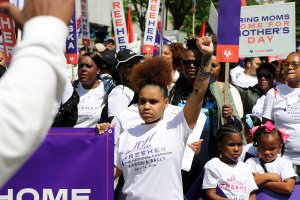Latest in Living News
Get up-to-date everyday life news from our reporters
Washington Spirit fans channel activism pitchside with ‘Free DC’
Spirit fans advocate for D.C. home rule at the 51st minute of games, bringing community activism to soccer stadiums nationwide.
read more
Watch: DC breaks Guinness World Record for most couples kissing under a mistletoe
1,435 couples simultaneously puckered up early Saturday evening, breaking the previous world record of 480.
read more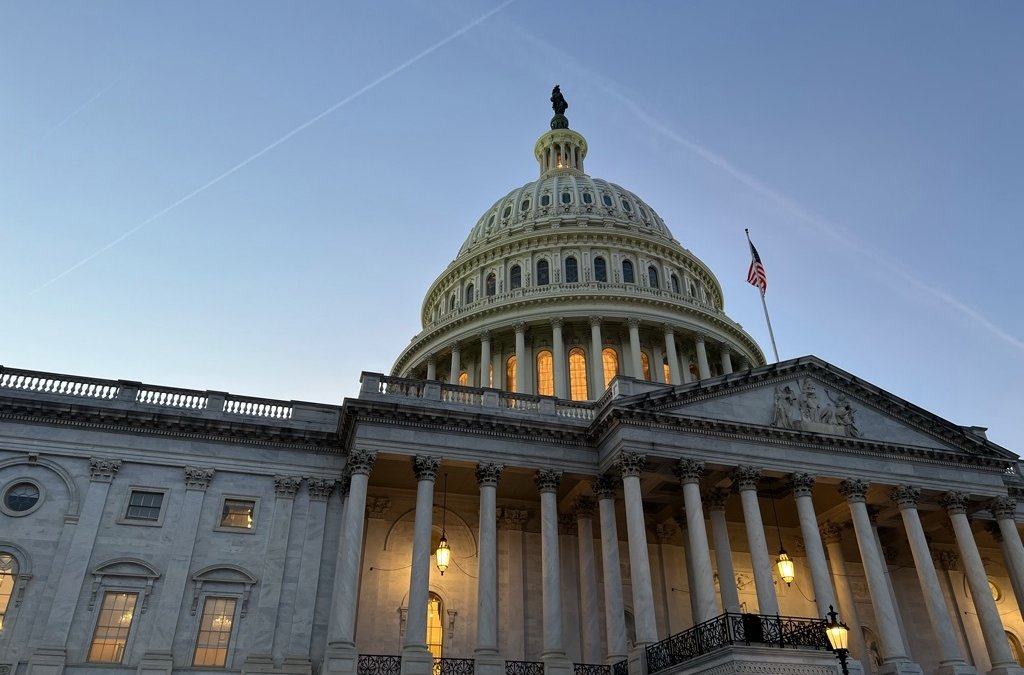
As cities test guaranteed income, congresswoman pushes for federal pilot
A U.S. congresswoman reintroduced an act that would establish a guaranteed income pilot program on the federal level, despite the fraught political climate.
read more
Federal workers’ holiday plans thwarted as government shutdown enters fourth week
“People will be getting fewer Christmas cookies this year.”
read more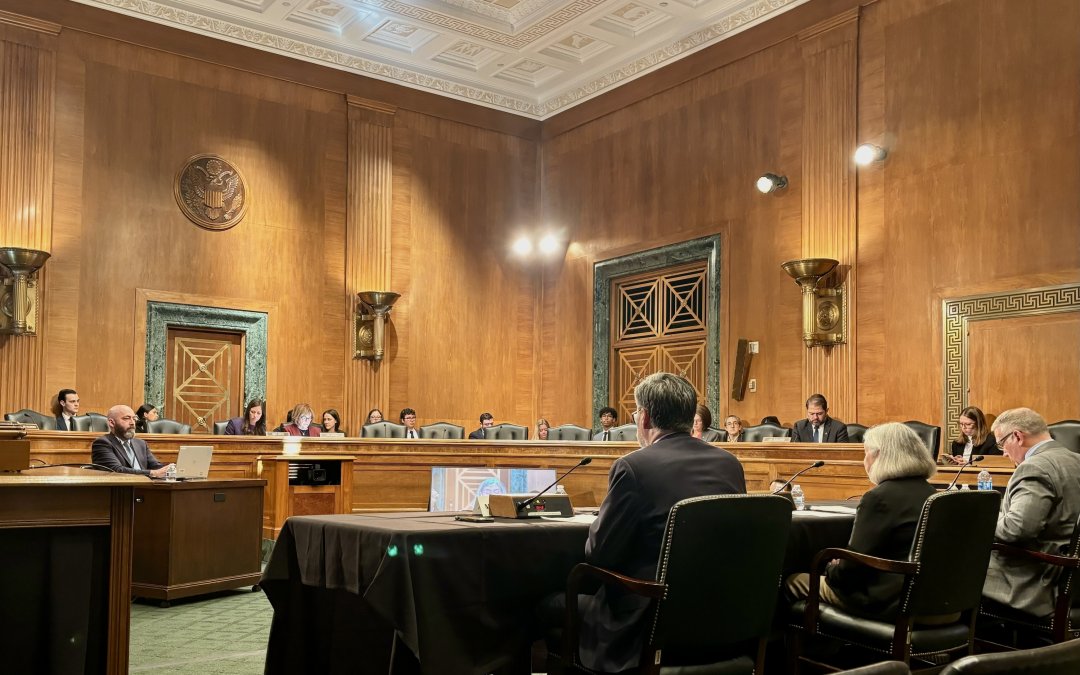
Bipartisan housing affordability and availability package awaits House amid shutdown
The Senate folded the ROAD to Housing Act into its NDAA, setting up negotiations with the House.
read moreSupreme Court hears arguments over Mexico’s suit against U.S. gunmakers
WASHINGTON – Supreme Court Justices heard oral arguments on Tuesday about whether U.S. gun manufacturers can be held accountable for the production and sale of firearms and the proximate harm their products cause in Mexico by contributing to drug cartel violence.
In 2021, the Mexican government filed a lawsuit against U.S. gun manufacturers, claiming they had aided and abetted illegal gun sales to traffickers for use by Mexican cartels. The suit alleged firearms companies engaged in business practices for decades that created a supply of weapons smuggled across the U.S.-Mexico border.
The Mexican government is asking for $10 billion in damages in addition to “injunctive relief,” which would impose new gun control measures in the U.S.
A federal district court in Massachusetts dismissed the case under Protection of Lawful Commerce in Arms Act (PLCAA), which bars lawsuits against firearms companies based on criminals misusing their products.
The U.S. Court of Appeals First Circuit reversed the decision, ruling that PLCAA does not apply in this case since Mexico has claimed gun manufacturers’ business practices have aided and abetted firearms trafficking to cartels, which has ultimately harmed the Mexican government.
This is the first time the Supreme Court has considered the legality of PLCAA since it was enacted with bipartisan support in 2005.
Raymond M. Sarola, of counsel at Cohen Milstein, filed an amicus brief in support of Mexico on behalf of law enforcement officers across the country.
If the court rules in favor of the Mexican government, Sarola said, “Hopefully litigation like this would cause an industry to take affirmative steps when it is aware that the conduct that it is engaged in is having these terrible consequences.”
During oral arguments, justices appeared skeptical of both sides.
Justice Amy Coney Barrett pressed Noel Francisco, the lawyer arguing on behalf of the gun companies, on how the issue of proximate cause was framed within the context of the case.
“You haven’t sued any of the retailers that were the most proximate cause of the harm. And you haven’t identified them that I can tell in the complaint.”
In an amicus brief supporting the petitioners Smith and Wesson Brands, David Tryon, the Director of Litigation at The Buckeye Institute, argued that a ruling in favor of Mexico could potentially cripple American gun manufacturers, which he believes encroaches on the Second Amendment.
“This is a Second Amendment case because they are very clear, because that law was passed to protect the Second Amendment, and this is designed to invade that law and to attack the firearms industry and basically bankrupt the firearms industry, because they’re asking for billions and billions of dollars in damages.”
When hearing arguments in Mexico’s favor, Justice Ketanji Brown Jackson expressed her concern about PLCAA and protecting Congress’s prerogative to regulate the firearms industry.
“All of the things that you ask for in this lawsuit would amount to different kinds of regulatory constraints that I’m thinking Congress didn’t want the courts to be the ones to impose.”
Timothy Lytton, a Regents’ Professor and Professor of Law at Georgia State University who filed an amicus brief on behalf of Professors of Tort Law, Statutory Interpretation, and Firearms Regulation in support of neither party, emphasized the impact that a ruling in favor of Smith and Wesson could have on the legitimacy of PLCAA.
“If the court holds in favor of Smith and Wesson’s argument with regard to proximate cause, it will eliminate any possibility of liability for injury arising out of criminal misuse of a weapon. That would be a radical expansion of what Congress intended when it passed the federal immunity shield.”
The court is expected to reach its decision in summer 2025.
Photo Essay: New Orleans spirit comes to Washington at eighth annual Mardi Gras celebration
WASHINGTON – Mardi Gras celebrations filled Wharf Street Saturday as attendees packed the street with food, laughter, music and dancing.
The celebration kicked off with an hour-long parade down Wharf Street. Over 40 organizations participated in the parade, including community partners like the Eastern High School Marching Band and Command Force of the Washington Commanders.
Golf carts embellished in purple, green and gold, the Mardi Gras king and queen and jugglers were just a few of the parade’s highlights. The New Orleans spirit could be felt in Washington as crowds cheered and reached for the beads, toys and candy that were tossed their way.
The parade was followed by live music by local bands at different outdoor stages along Wharf Street. Families and friends came together to enjoy food and drinks while dancing to the music. The celebrations came to a close with fireworks that decorated the sky.

Mardi Gras flags lined Wharf Street as Batalá Washington, an all-women Afro-Brazilian music band, announced the start of the parade with the sound of drums. (Jiah Choe/MNS)

Addie, Asia and Jodie showed their Mardi Gras spirit from head to toe. Jodie is from New Orleans, and Addie and Asia are Washington residents. “It’s a big deal, bring the party home,” Asia said. (Jiah Choe/MNS)

Rachelle, Kathleen, Margie, Jennifer, Lynn and Melissa are long-time friends and residents of D.C. and Virginia. Kathleen has been to every single one of the eight Mardi Gras celebrations at The Wharf. “We love it. It gets us out of the house,” Rachelle said. (Jiah Choe/MNS)

Beads and candies weren’t the only things being tossed to the audience. Children and adults alike reached for the bubbles flowing out of the bubble machines while some took photos. (Jiah Choe/MNS)

The Wharf invited local businesses to decorate golf carts as an alternative to the floats traditionally used in New Orleans. The family friendly event had several young participants, some even playing a role in the parade and tossing beaded necklaces to attendees. (Jiah Choe/MNS)

Some attendees chose to enjoy the parade with an aerial view from restaurant balconies and rooftops. Parade participants made sure everyone was included in the celebration, as they tossed beads as high as they could to reach the attendees watching from above. (Jiah Choe/MNS)

Humans weren’t the only ones celebrating Mardi Gras at The Wharf. Local residents “Percy and his human servants” also joined the celebrations in colorful Mardi Gras costumes. (Jiah Choe/MNS)

Performers, jugglers and stilt walkers filled the parade with entertainment and excitement. (Jiah Choe/MNS)

Bella, Manny and Prince are from New Orleans. They came to Washington for their catering business, Mardi Gras Munchies (@mardigrasmunchies on Instagram). They are “an authentic Cajun Creole New Orleans cuisine” with pop-ups every week. Their son, Prince, is six months old. This was his first Mardi Gras. (Jiah Choe/MNS)

Attendees lined up to take photos with Mardi Gras performers at a photo station set up near the outdoor stages. (Jiah Choe/MNS)
Watch: The Great American Water Taste Test brings friendly competition to Capitol Hill
WASHINGTON — The National Rural Water Association held its 26th annual Great American Water Taste Test on Wednesday. The Bear River Water Conservancy District of Utah took home the championship.
Samples are judged on three categories: clarity, bouquet and overall taste.
This competition is a part of the NRWA’s annual rally. Members of the organization travel to the nation’s capital to lobby their representatives about issues facing the rural water industry.
Watch the video report here:
Watch: The 17th Annual Lincoln Oratory Festival Brings History to Life
WASHINGTON — The 17th Annual Lincoln Oratory Festival hosted 293 local elementary and middle school students at Ford’s Theatre, the site of the assassination of Abraham Lincoln.
The event showcased third-grade through eighth-grade students who performed historical speeches, most of which were written by Lincoln himself.
Watch the video report here:
Watch: Housing secretary nominee testifies at Senate hearing
WASHINGTON –– Eric Scott Turner, Trump’s pick for the Secretary of Housing, Development and Urban Development is headed to a full Senate vote after being narrowly approved in committee.
He is the first nominee to be approved without an FBI background check, to the dismay of democrats like Sen.Elizabeth Warren (D-Mass.).
Watch the video report here:
Biden pardons ‘Peach’ and ‘Blossom’ ahead of Thanksgiving
WASHINGTON — President Biden pardoned turkeys Peach and Blossom on Monday, officially freeing them to live out lives of comfort and luxury in Minnesota, instead of ending up on a dinner table this Thanksgiving.
Biden made the pardon on the South Lawn with the help of John Zimmerman, chairman of the National Turkey Federation, and Zimmerman’s 9-year-old son Grant.

Biden points at Peach. (Sarah Lin/MNS)
The two turkeys are named after the Delaware state flower, the peach blossom. Biden served as the Senator from Delaware for over 35 years before becoming vice president in 2009.
Continuing a White House tradition started by the Truman presidency in 1947, Biden also gave thanks in true Thanksgiving fashion.
“It’s my last time to speak here as your president during this season and give thanks and gratitude,” Biden said. “Let me say to you, it’s been the honor of my life. I’m forever grateful.”
Photos: Embassy Row’s fashionable trick-or-treaters
WASHINGTON — Embassy Row opened its doors to candy-seeking trick-or-treaters on Thursday as children of all ages celebrated Halloween.
While some embassies, such as Indonesia’s, offered imported candies from their country, others opted for more common American staples, placing Snickers, Twix and Tootsie Rolls in baskets.
Amanda Lee took her 8-month-old daughter Harper to trick-or-treat at the embassies.
“We were looking for daytime activities and culturally unique things to do,” Lee said.
Beyond parents and young children, many college students also participated in the Halloween tradition.
Sophie Carr, a senior at Georgetown University, said she discovered which embassies were open for trick-or-treating through a Washingtonian magazine article.
“We always wanted to do embassy trick-or-treating, but it’s hard since we have class during the day,” Carr said.
This year, Carr and a friend decided to skip class and celebrate Halloween by picking candy up on Massachusetts Avenue.
“It’s our last year in D.C. and we wanted to make memories,” she said.

“Enter if you dare,” reads a sign hung on the Embassy of Indonesia’s fence. (Sarah Lin/MNS)

Trick-or-treaters climb the steps of the Embassy of Greece. (Sarah Lin/MNS)

A trick-or-treater takes a water break while walking up Embassy Row. (Sarah Lin/MNS)

Two trick-or-treaters walk up Embassy Row. (Sarah Lin/MNS)

A trick-or-treater dressed as The Lorax. (Sarah Lin/MNS)

Three trick-or-treaters walk past the Embassy of Turkey. (Sarah Lin/MNS)

A trick-or-treater dressed as an astronaut checks their phone. (Sarah Lin/MNS)

A trick-or-treater enters the Embassy of the Republic of Haiti. (Sarah Lin/MNS)

A trick-or-treating duo walks up Embassy Row. (Sarah Lin/MNS)
DC Residents Highlight Strengths and Shortcomings of Housing Authority Restructuring
WASHINGTON — Residents and prospective tenants appeared appreciative of new leadership, but eager to see more change at the first District of Columbia Housing Authority public oversight roundtable on Tuesday, which saw benefit recipients directly address the councilmembers overseeing the fraught government agency.
“[DCHA’s new director] Keith Pettigrew is our black panther,” voucher recipient Rhonda Hamilton said. “He knows and is experienced in how to manage a housing authority.”
This hearing was part of the authority’s three-year plan to restructure and increase transparency in the agency after a 2023 controversy involving overpaying landlords alongside an uptick in housing insecurity in Washington.
Residents currently receiving housing assistance raised concerns that the restructuring of the DCHA organizing board only maintains one seat for local representation, while previous boards had multiple neighborhood seats.
“We want our other residents to have a vote,” Christine Spencer, a DCHA housing recipient, said. She added though that she does appreciate that she can “walk out the door and see [DCHA community] events in your neighborhood…it’s refreshing.”
Councilmember Zachary Parker (Ward 5) agreed with the need for representation. “It feels like there’s a firewall between tenants and DCHA employees,” he said.
A 2023 Washington Post investigation revealed that the DCHA, which is an independent agency of the DC government, incorrectly overpaid rent for more than 15,000 households, totaling over one million dollars per month. The investigation also reported that many units provided for by the authority lacked adequate facilities, such as electricity and accessible entrances. This led to a turnover in management.
DCHA’s new leadership said they will need time to address these critical issues and point to the three-year plan, which involves more considerable structural changes to the authority’s operation, including better landlord oversight.
Residents also worried about problems that the DCHA takes too long to address.
“The biggest problem I think is a breakdown in communication,” Ronald Smith, who received his voucher after twenty years on the waitlist and requires extra room for his medical equipment, said. “My voucher is only for a one bedroom unit. The space [my wife and I] live in now is deplorable. I don’t know what to do, I need to leave this place but I can’t fit in a one-bedroom.”
The plan, which would be carried out through 2027, would also provide more resources to the Office of Customer Engagement, aimed at boosting assistance and support for residents in need.
“Whenever there’s a new administration and communication changes…it feels like I’m starting over,” Linda Brown said, a resident who worries these organizational changes will make her home unaffordable. “I just don’t feel represented.”
Despite these issues, local elected officials generally approved of the new leadership.
“Since Keith Pettigrew took over the agency has taken big strides,” Housing Committee chair Robert C. White (At-Large) said. “It’s about creating a foundation for lasting improvement. That’s what residents want and deserve.”
VIDEO: Take Steps 2024 raises $200K for IBD Support and Research
WASHINGTON — The Crohn’s and Colitis Foundation hosted Take Steps 2024 on Saturday, drawing the largest crowd in years, according to organizers. Individuals diagnosed with inflammatory bowel disease (IBD), their caregivers and healthcare professionals gathered to celebrate the latest fundraising achievements.
“We’ve actually hit our goal of $200,000 this morning,” said Marissa Spratley, the fundraising manager of the foundation.
Donations will fund groundbreaking research, better treatments and programs aimed at improving the quality of life for those living with IBD.
WATCH THE VIDEO STORY HERE:
FreeHer protesters call on Biden to ‘Bring Moms Home’ from prisons and jails
WASHINGTON — “Bring Moms Home for Mother’s Day,” called protesters at the 10th Anniversary FreeHer March and Rally on Wednesday.
Organized by The National Council for Incarcerated and Formerly Incarcerated Women and Girls, the peaceful protest emphasized that this Mother’s Day, nearly 150,000 incarcerated mothers will not be able to celebrate, separated from their children. Many of the mothers are awaiting trial in jail, unable to pay the bail that in some cases might be equal to their annual income. The rally participants called on President Joe Biden’s administration and state governors to take urgent action.
“With a stroke of a pen, they can unite families,” said Ebony McMorris, a White House Correspondent at American Urban Radio Networks.
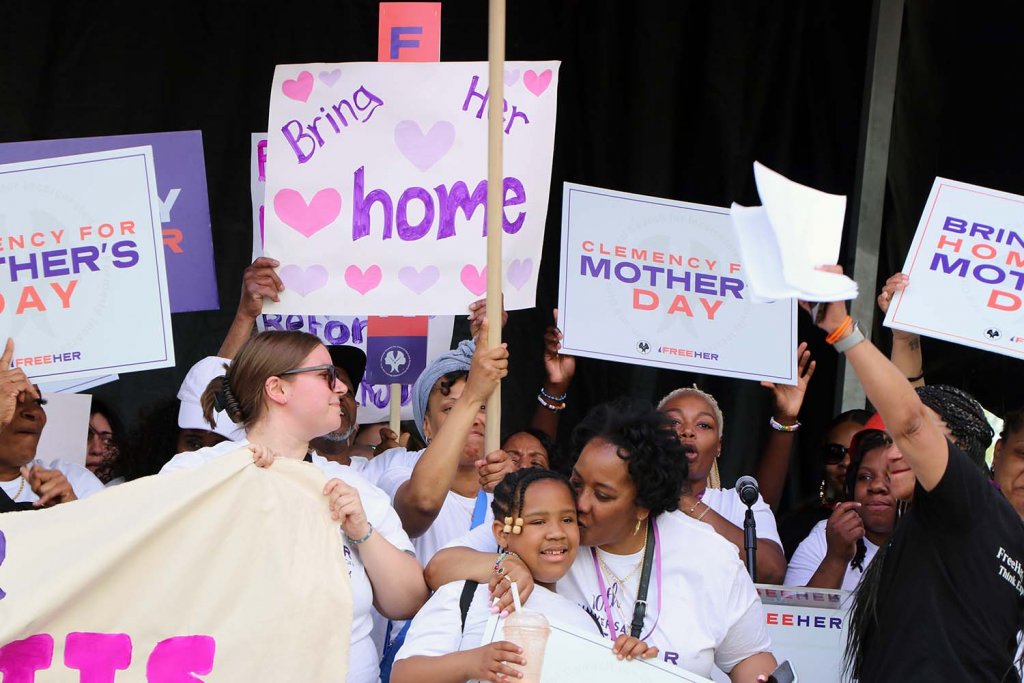
Protesters from Massachusetts hold signs at the FreeHer March and Rally in Washington on April 24, 2024. (Sophia Didinova/MEDILL NEWS SERVICE)
The Council members pinned their hopes on Biden’s presidency, whom they met as a Vice President of former President Barack Obama. Andrea James, Founder & Executive Director of the Council, remembered talking to President Obama in 2014.
“We said, Mr. President, as you’re going into the federal prisons, please remember that women are incarcerated too. They are mothers, grandmothers, sisters, aunts, wives, and we need them to come home,” she recalled.
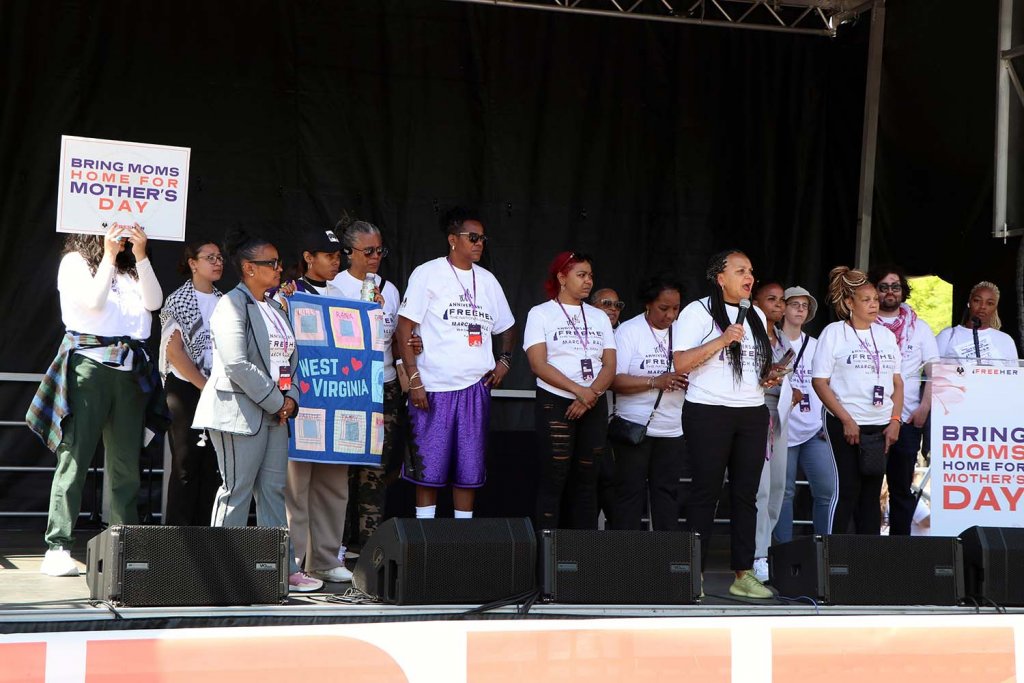
Andrea James (with the microphone) addresses protesters from the stage on April 24, 2024. (Sophia Didinova/MEDILL NEWS SERVICE)
President Obama granted clemency 1,927 times over eight years in office, the highest total of any president since the 1950s.
President Biden, however, needs to be more proactive, according to The Council. He granted clemency to 16 individuals the day of the protest, but James believes it is insufficient.
“Guess what President Biden gave us?” she pointed out his latest clemency acts. “I guess all the White House heard us say was that we wanted just a little bit of freedom.”
“We want it all,” some in the audience screamed back.
The Council speakers, along with national allies and organizations, emphasized the case of Michelle West, who they believe tops the list for urgent clemency.
West was charged and convicted in a drug conspiracy case that held her responsible for the actions of her co-conspirators in 1994. The Judge imposed a life sentence plus 50 years, plus five years probation for a first-time offender.
“When I last wrote about Michelle’s case, I was hoping that it added to the efforts… to correct a wrong that had been done,” Walter Pavlo, an expert on federal criminal law enforcement, wrote for Forbes in 2021.
Yet West’s clemency was rejected in 2015, and no action has been taken since. The recent closing of the FCI Dublin prison further exacerbated West’s situation, as she is being moved around other prison facilities without knowing her final destination.
“My mom is not a slave, and it feels like slavery at this point,” said Miquelle West, Michelle West’s only daughter.
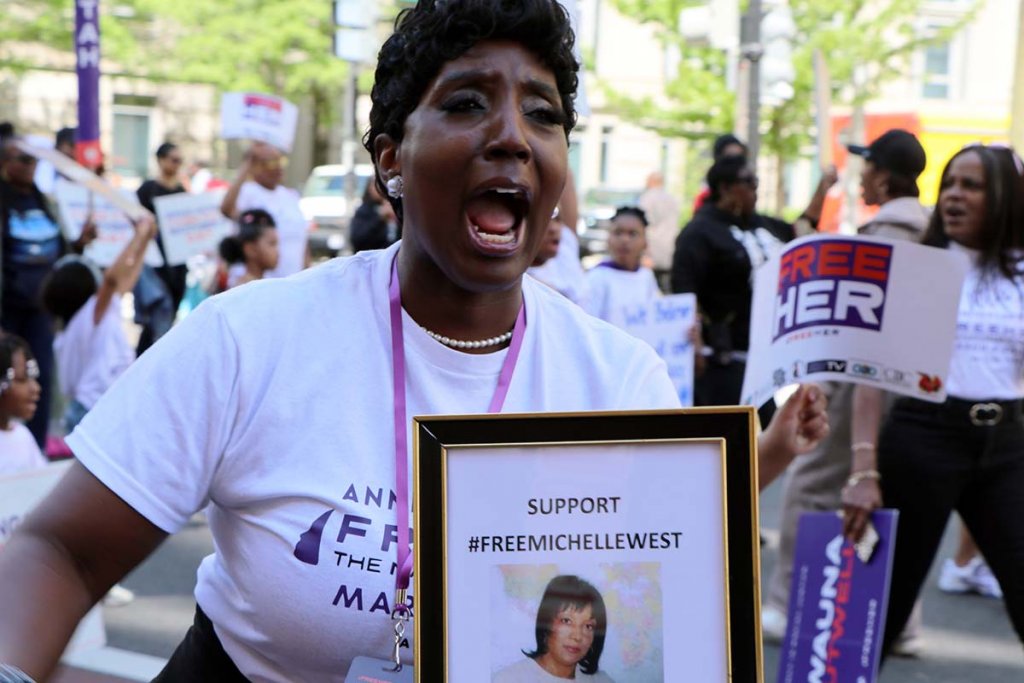
Tiawana Brown, Founder of Beauty after the Bars, calls for clemency for Michelle West during FreeHer March on April 24, 2024. (Sophia Didinova/MEDILL NEWS SERVICE)
Children of incarcerated and formerly incarcerated mothers were leading the march, calling to have their families united. On the other side, many formerly incarcerated women came to fight to have their children back.
Fifty-eight percent of imprisoned women in state prisons have a child under the age of 18, and often, the mothers are separated from their children for the first time upon entering prison.
“FreeHer to me also means free my kids,” said Kimberly Dunne, Co-National Organizer at the Formerly Incarcerated & Convicted People and Families Movement. “I lost my kids to incarceration, and my kids are still abandoned, as I say, by adoption. FreeHer is extended to my kids because they are still not free.”

Kimberly Dunne talks about her children on the stage. April 24, 2024. (Sophia Didinova/MEDILL NEWS SERVICE)
As Mother’s Day approaches, fractured families, missing mothers and the risk they impose on children’s futures are at the forefront of this primarily black community of activists. Amanda Wilders is among the organizers of the Black Mothers March on the White House, which is planned for May 12.
“We know this day is not a happy day for many mothers,” she said. “We understand that this state is the problem, and we all have a common enemy: the United States government.”
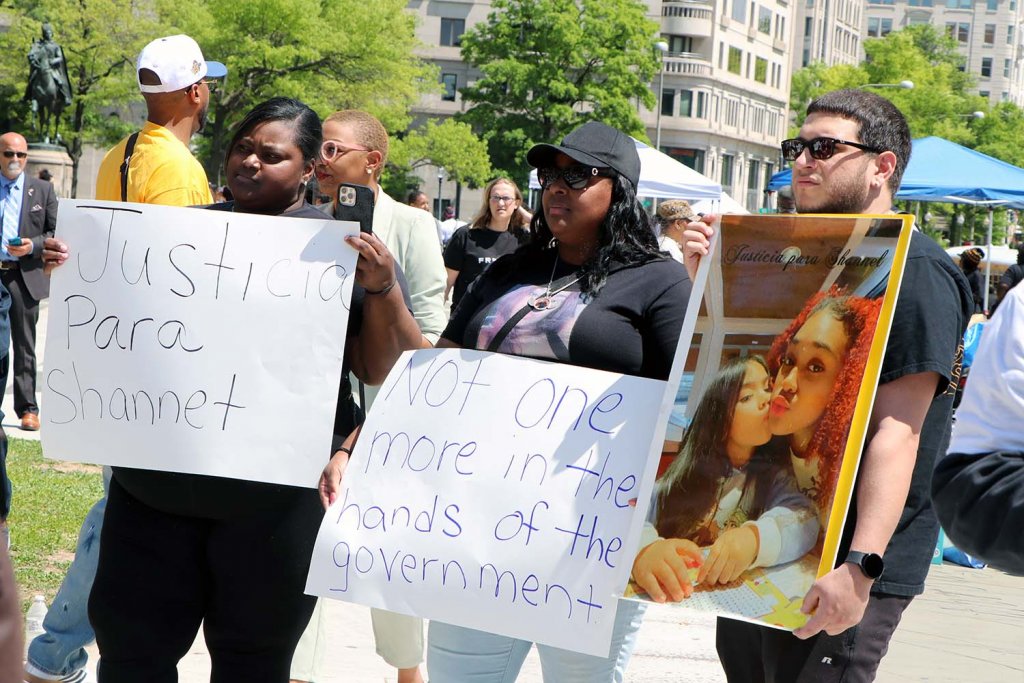
FreeHer protesters display their mistrust in the government with banners. April 24, 2024. (Sophia Didinova/MEDILL NEWS SERVICE)
“The problem is that this country has gone on not caring, not liberating, and has been putting prison over our community,” said McMorris, and many protesters loudly agreed with her.
The Council, among other participant organizations, believes the incarceration system harms society, as long prison sentences do not deter crime but destroy lives. Instead, the Council advocates that tax dollars should be put into providing resources to at-risk families and communities, including initiatives like affordable housing, post-incarceration employment, and reinstating voting rights.
“Clemency, commutation, sentencing reform – those are the meantime solutions,” said Shekhinah Braveheart, Advocacy Associate at the Justice Policy Institute. “But the end goal is to end this system that has fractured our families, exacerbated trauma, destabilized our community and rehabilitated no one.”
View more photos from the April 24, 2024, 10th Anniversary FreeHer March and Rally:
In Photo: Anti-war group distributes free vegan food to combat poverty, hunger
WASHINGTON – The Washington chapter of Food Not Bombs, a volunteer group that gives out free vegan meals to combat poverty and hunger, distributed meals on Saturday, undeterred by persistent rain.
D.C. is one of over 1,000 cities in 65 countries served by Food Not Bombs, according to its website. The first of the autonomous, non-hierarchical chapters was founded by anti-nuclear activists in 1980 in Cambridge, Mass.
Will Reid, a leading member of the D.C. branch, said he often ate from Food Not Bombs in Houston, Texas when it provided food for the Occupy movement, an international movement in the early 2010s that advocated for socio-economic justice.
Reid started volunteering for Food Not Bombs in 2014 when he moved to Washington. He now devotes around nine hours to the group each week, and he “can’t stop thinking about it.”
“The vast majority of friendships that I have in D.C. I can somehow trace back to Food Not Bombs,” Reid said.
The group dishes out food donated by local businesses that otherwise would have been thrown away.
In addition to reducing food waste, another of the group’s guiding tenets is nonviolence. The D.C. chapter has provided food for multiple Gaza ceasefire protests.
The group distributes only vegan options to avoid food safety issues, serve individuals who do not eat animal products, oppose violence in the animal industry and provide nutritious options.
It serves around 25 to 75 people each week in the winter, and around 75 to 150 people in the summer, Reid estimated.

Volunteers Will Reid (right) and Jason (left) share an umbrella in the rain. They met in 2014 when they got involved with Food Not Bombs. (Lindsey Byman/MNS)

Vegan donuts from Donut Run in Tacoma are a staple handout for Food Not Bombs. Reid said eating these donuts each week is a perk of volunteering. (Lindsey Byman/MNS)

A volunteer hands someone a hot drink. Volunteers are instructed to wear masks and gloves when they serve food. (Lindsey Byman/MNS)

A volunteer scoops spaghetti into a plastic container. This week’s menu also included chili, fresh fruits and vegetables and brownies. (Lindsey Byman/MNS)

Stacked containers of food sit on a plastic folding table. Food Not Bombs aims to reduce food waste by giving out items that would otherwise have been thrown away. (Lindsey Byman/MNS)

A volunteer hands someone a hot beverage over the table. Many volunteers knew the people they served by name. (Lindsey Byman/MNS)
Supreme Court takes up the case involving a BMW, a robbery and blown deadlines
WASHINGTON – When is it too late for the government to provide notice that they are seeking forfeiture in criminal cases? That was the question at the heart of a Supreme Court hearing on Tuesday.
The case arose after a federal jury in New York convicted Louis McIntosh in 2013 for violating multiple robbery and firearm offenses. A federal district court ordered him to forfeit $75,000 and a BMW he purchased with robbery funds.
At the sentencing, the government was instructed to submit a written order within a week, as per the Federal Rules of Criminal Procedure. The government failed to meet that time frame, instead submitting the order three years later for the money and car.
McIntosh sued and the case made its way to the Supreme Court, where the justices had a chance to revisit some of what they handled in their previous appointments to the bench.
“When a preliminary order of [criminal] forfeiture is not entered as it should be prior to sentencing, then the government loses its right to forfeiture,” McIntosh’s attorney, Steven Yurowitz, argued.
Several justices seemed skeptical that the time limits in the criminal code were mandatory.
Referencing her experience as a district judge, Justice Sonia Sotomayor noted that courts are usually flexible. “They set a fixed deadline. Something you can know and meet without discretion being involved.”
The Supreme Court has a precedent to rely on: In Dolan v. United States, the high court decided that a restitution order was valid despite it being submitted after the 90-day deadline as spelled out in the Mandatory Victims Restitution Act.
That case “recognized what I’ll call a ‘better late than never’ rule in complying with congressional directives,” Justice Neil Gorsch said.
In that decision, made in 2010, the Supreme Court outlined three types of deadlines: “jurisdictional rules” which are strict and can’t be overlooked; “claims processing rules,” which regulate timing but can be waived; and “time-related directives” intended to keep cases timely but are not absolute.
Justice Ketanji Brown Jackson asked whether the latest case had a deeper procedural error that needed a high court ruling. She pressed Yurowitz on whether a missed jurisdictional deadline should face consequences. He replied that a defendant is subject to sentence even though the government missed its deadline.
Chief Justice John Roberts raised hypotheticals about forfeiture timelines that a defendant could face in their sentencing.
“In this case there was no order entered until three years after,” Yurowitz responded. “Forfeiture is an element of sentencing and there’s an element of finality to it.”
Assistant to the Solicitor General Matthew Guarnieri argued that both the U.S. Appeals Court for the Second Circuit and federal district court offered the defendant notice of the forfeiture, and he had the opportunity to contest it before the sentencing process.
“The second circuit itself established that there was no prejudice to the defendant here,” Guarnieri said.
The justices asked whether they may violate the claim processing rule they set forth.
“I don’t think the court needs to address it,” Guarnieri said. “In general, the rule here contemplates that the court will announce the forfeiture as part of imposing sentence on the defendant and if the court purports to act after sentencing… then we have a harder set of issues.”
A decision in the case is expected to be issued by June.








